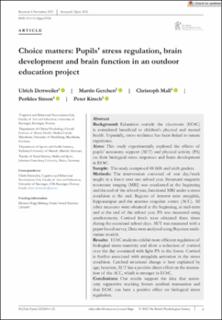Choice matters: Pupils' stress regulation, brain development and brain function in an outdoor education project
Peer reviewed, Journal article
Published version
Permanent lenke
https://hdl.handle.net/11250/3011144Utgivelsesdato
2022-07-24Metadata
Vis full innførselSamlinger
Originalversjon
Dettweiler, U., Gerchen, M., Mall, C., Simon, P., & Kirsch, P. (2022). Choice matters: Pupils' stress regulation, brain development and brain function in an outdoor education project. British Journal of Educational Psychology. 10.1111/bjep.12528Sammendrag
Abstract
Background
Education outside the classroom (EOtC) is considered beneficial to children's physical and mental health. Especially, stress resilience has been linked to nature experience.
Aims
This study experimentally explored the effects of pupils' autonomy support (AUT) and physical activity (PA) on their biological stress responses and brain development in EOtC.
Sample
The study comprised 48 fifth and sixth graders.
Methods
The intervention consisted of one day/week taught in a forest over one school year. Structural magnetic resonance imaging (MRI) was conducted at the beginning and the end of the school year, functional MRI under a stress condition at the end. Regions of interest were amygdala, hippocampus and the anterior cingulate cortex (ACC). All other measures were obtained at the beginning, at mid-term and at the end of the school year. PA was measured using accelerometry. Cortisol levels were obtained three times during the examined school days. AUT was measured with a paper-based survey. Data were analysed using Bayesian multivariate models.
Results
EOtC students exhibit more efficient regulation of biological stress-reactivity and show a reduction of cortisol over the day associated with light PA in the forest. Cortisol is further associated with amygdala activation in the stress condition. Cerebral structural change is best explained by age; however, AUT has a positive direct effect on the maturation of the ACC, which is stronger in EOtC.
Conclusions
Our results support the idea that autonomy supportive teaching fosters cerebral maturation and that EOtC can have a positive effect on biological stress regulation.

